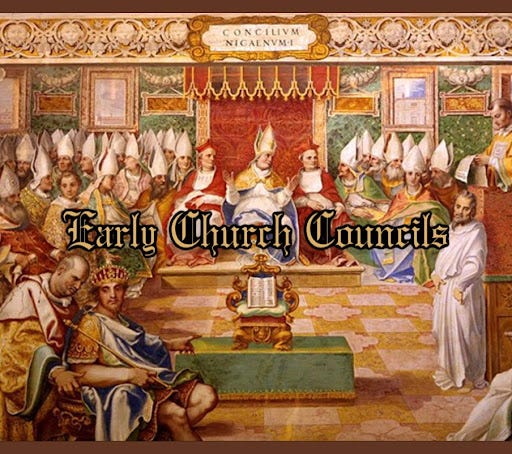Non-Religious Answers to the 10 Greatest Religious Questions
Is Satan real, how will the world end, did Jesus believe in God, and what is the true religion?
Part of my academic background is in theology, which means I can create elaborate and sophisticated explanations for matters related to God and religion. Sometimes this is helpful, other times it’s not. It’s good to occasionally step back and uncomplicate things.
My undergrad degree is in journalism, and I have done a lot of writing over the years - published books, newspaper columns, scholarly journals, online websites and publications, and now Substack. It may come as a shock to know, given the length of some of my articles, that I despise wordiness and clutter in my writing. William Strunk Jr. wrote in The Elements of Style:
“Vigorous writing is concise. A sentence should contain no unnecessary words, a paragraph no unnecessary sentences, for the same reason that a drawing should have no unnecessary lines and a machine no unnecessary parts. This requires not that the writer make all sentences short, or avoid all detail and treat subjects only in outline, but that every word tell.”
As someone who toils in the humanities and social sciences, it’s not that difficult to lead fairly spectacular, intricate, and involved expeditions into labyrinthine hypotheses and theories. Yet, I have grown to appreciate the sentiment of the K.I.S.S. principle - Keep It Simple, Stupid.
Previously, I posted an article titled, One-Sentence Answers to Life's Greatest 11 Questions: Is Overthinking Existence our Biggest Problem? It felt like it was time for another one of those. Occam’s razor is a problem-solving principle that suggests the simplest explanation is often the best one. With that in mind, I am going to offer simple non-religious answers to the greatest questions of religion.
Since my religious background is Christianity, I’ll focus on questions especially related to the Christian religion. I refer to them as “non-religious answers” because they do not require faith, belief in God or any religious beliefs, or acceptance of the supernatural. In other words, my answers are meant to offer an alternative way of approaching these questions entirely outside the framework of traditional religious thinking. It goes without saying that not everyone will agree with these answers, particularly traditional Christians. I forced myself to give the shortest answer possible, but in some cases not short enough. I tried.
I chose questions that were a bit more provocative and nuanced to make it interesting. For each answer, I offer a link to previous writings of mine on each subject.
(1) Did Jesus exist?
A figure, known as “Jesus Christ” in Christian literature, was likely a real person who lived in Palestine in the First Century. He was an itinerant teacher who traveled and taught throughout Palestine gathering followers around him through the force of his personality and the compelling nature of his message. He was viewed by the Roman occupiers of Palestine as a dangerous religious radical and a disturber of the peace. Jesus infuriated the religious establishment for refusing to legitimize it. Consequently, he was arrested by the local authorities and summarily executed by the Romans in a public crucifixion, the standard method used by the Romans to deal with troublemakers. The figure and story of Jesus holds sway as an enduring archetype, including finding meaning in suffering. Jesus is the central figure of the Christian religion, which in many cases is unfortunate for Jesus. I wrote a Note specifically on the topic of the historicity of Jesus.
(2) Is Jesus God?
When asked about his relationship with God, Jesus insisted: “The Father is greater than I” (John 14:28). These and other statements of Jesus were meant to put the brakes on the formation of any kind of Jesus-worshipping cult. The divinity of Jesus was invented and solidified at church councils in the fourth century. The Council of Nicaea, summoned by Constantine, invented the doctrine of the Trinity and elevated Jesus to its second member, so that Christianity might better serve as a stable glue for his sprawling empire. It’s a stretch to get from the Bible that Jesus ever claimed to be God in the way Christian orthodoxy holds. The whole point of Jesus was to deliver the message that we all are divine and human. Our life’s journey is expressing our transcendence in a body-mind lived human experience. The mission of Jesus was to correct the religious falsehood that humankind and God are separated, and to bear witness to the reality of humankind and God as one. When Jesus said “I and the Father are one”, he was not speaking as a 1st Century Jew in Palestine, he was speaking as a representative of the entire human race. Not only did Jesus not claim to be God, he did not even claim to be the only way to God. (I discuss this further in my article, Debunking the Jesus-Only Gospel.)
(3) Did Jesus believe in God?
Jesus was a Jew and would have learned traditional monotheistic teachings about Yahweh and Jehovah. Though Jesus affirmed much of Judaism, he vehemently opposed and radically redefined the traditional religious understanding of “God”. It would be wrong to assume that the common “Christian” view of “God” was taught or endorsed by Jesus. If you study Jesus closely in the gospels you discover that he did not subscribe to the major tenets of classic Christian theism. One could make the case that Jesus believed that “God” is the ground of all being, which we experience most intimately within ourselves through deep unitive feelings of love. Jesus used language that was readily available to him and his cultural and religious background such as “father”, “spirit”, and “kingdom of heaven”, but you have to do the work to realize that these words are pointing to a universally available, relevant and significant spiritual reality that each of us can actualize for ourselves. One of the best kept secrets about Jesus is how he challenged the religious conception of “God”. (My book Inner Anarchy fleshes out these ideas more extensively.)
Keep reading with a 7-day free trial
Subscribe to Deconstructionology with Jim Palmer to keep reading this post and get 7 days of free access to the full post archives.






